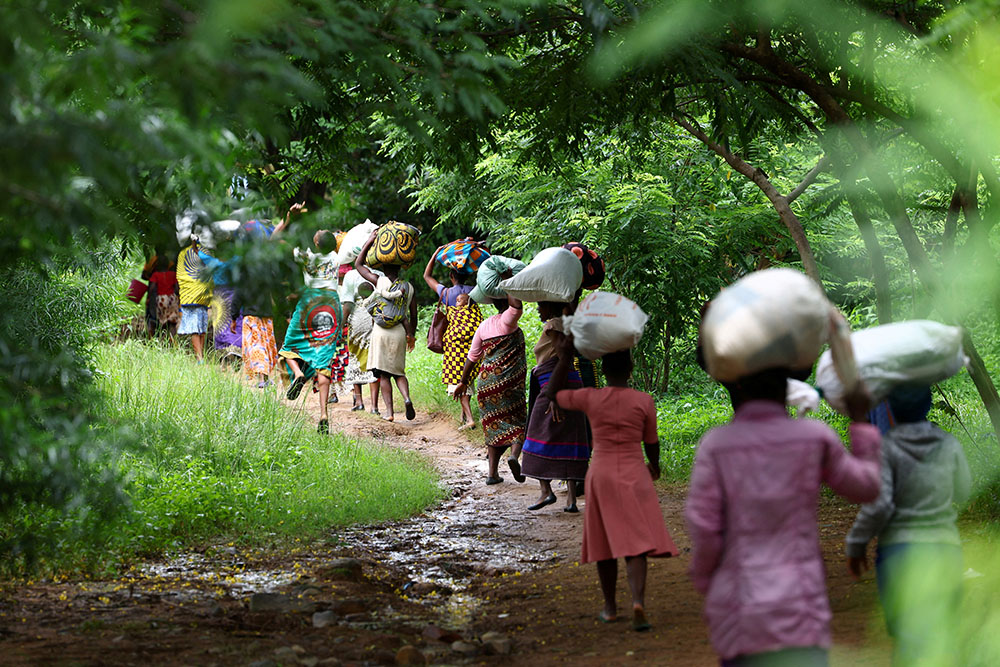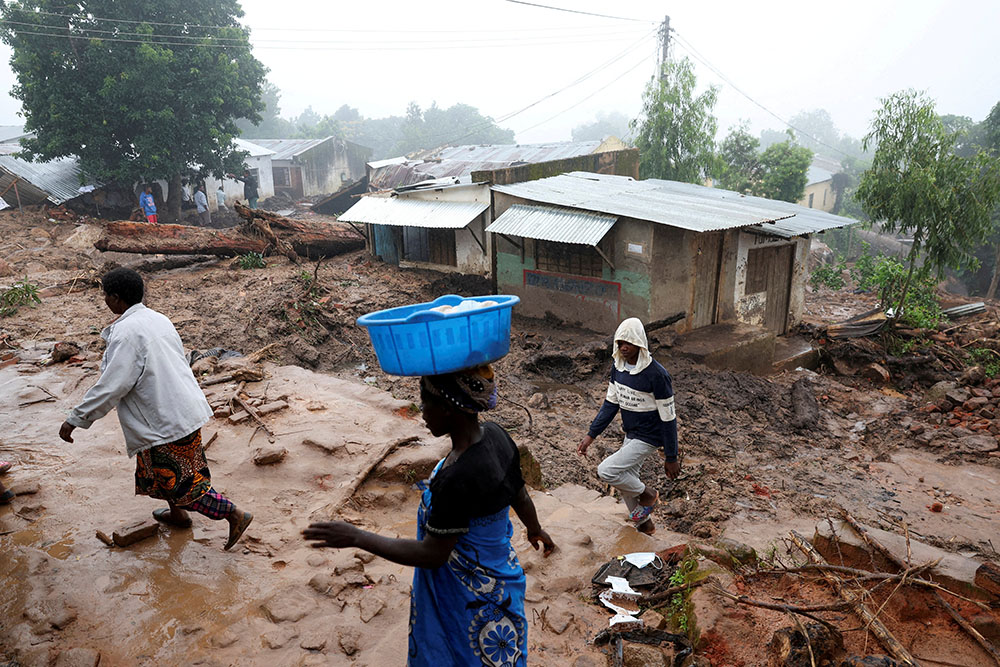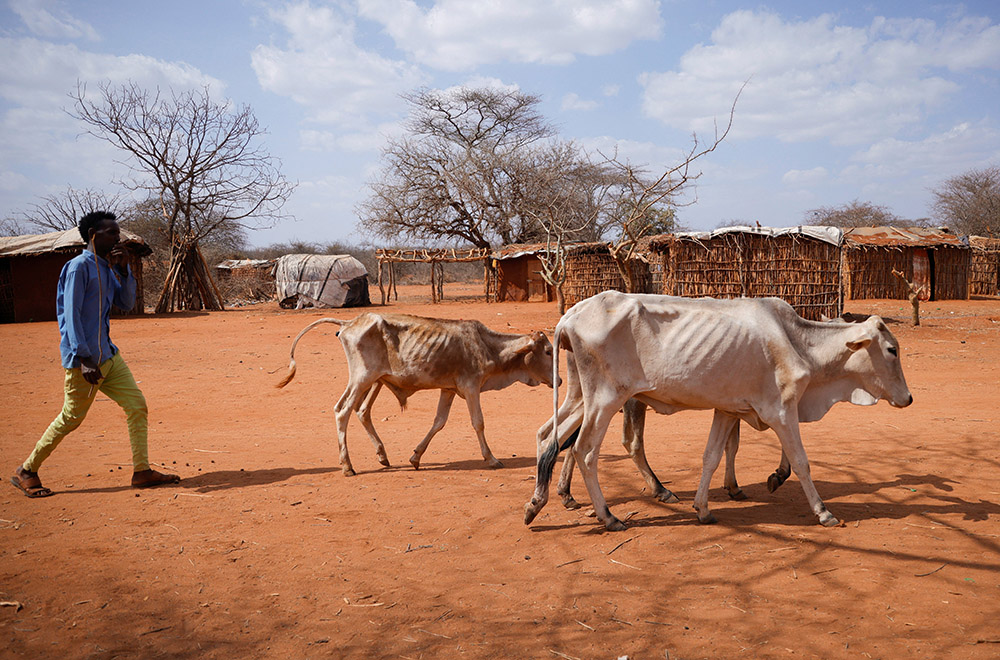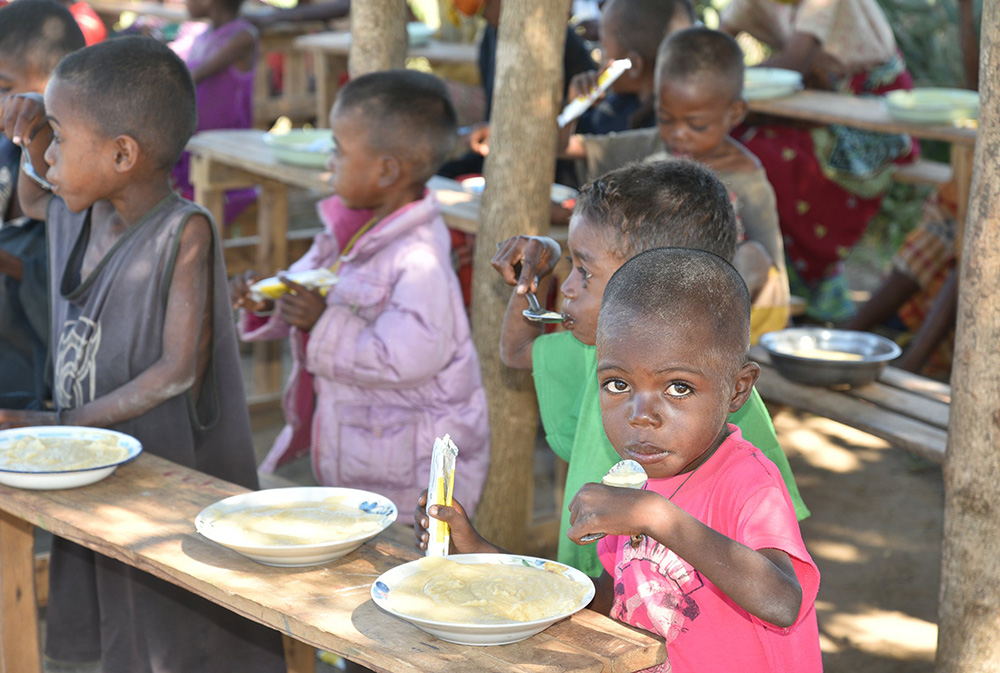
Flood victims from Mtauchira village carry food they received from the Malawi government in Blantyre March 16 in the aftermath of Cyclone Freddy, which destroyed their homes. (OSV News/Reuters/Esa Alexander)
"It is difficult to minister to hungry people," said Fr. Edmund Nyoka, parish priest at St. Teresa, Mzuzu Diocese in Malawi, the southern African country that has been battered by climate-change-related impacts over the past few years.
Malawi, the world's fourth-poorest country where 70% of the population lives on less than $2.15 per day according to the World Bank, has suffered prolonged droughts and dry spells, flooding and cyclones.
It is not alone, and experts are warning of even more such climate impacts for other sub-Saharan African countries. Food insecurity is worsening for the region as a result of economic hardships caused by the rising costs of inputs — seed, fertilizer, pesticides — and climate change impacts that affect crop yields.
In 2022, climate-change-related events placed an additional 140 million people across Africa into food insecurity. The Food and Agriculture Organization of the United Nations calculates the prevalence of sub-Saharan Africa's food insecurity at 64.2%.
For Nyoka, climate change and economic hardships are not only making life difficult for ordinary citizens, but also they are posing challenges to running the church. Many parishes are having to venture into farming, livestock rearing and other income-generating projects as collections from parishioners get disrupted as a result of the impacts of climate change and the related economic hardships.
"We run the church banking on collections from the same people affected by the impacts. If they don't have, they cannot give and this makes ministry very difficult," Nyoka, who recently transferred from St. Monica Parish in the same diocese, told Earthbeat.
This year, Malawi suffered from the effects of Cyclone Freddy in March, which brought destructive flooding. This was in the midst of an already difficult and dry season that was so severe that many crops had already been written off.
Amjad Ali, program director for Oxfam in Southern Africa, said that in Malawi and Mozambique, "torrential floods washed away everything, leaving farmers nothing" to harvest.
Malawian farmer Michenga Pensulo, 56, told Oxfam: "I have sold my 2 acres of farming land for about $100 because I need to buy food and other household needs. It was a painful decision because I sold it cheaply, but I can't stand to see my family starve."
For many others across sub-Saharan Africa, possession of land and the means to farm it is a luxury. And livestock — especially in dry-prone areas such as Zimbabwe's Matabeleland regions, as well as in some of Kenya's pastoral areas — has been decimated by drought conditions in the past few years.
This leaves households with no further source of income or means with which to till the land. The result is even worse food insecurity.

In Blantyre, Malawi, on March 17, people walk past houses that were damaged in the aftermath of Cyclone Freddy. (OSV News/Reuters/Esa Alexander)
The World Food Program's spokesperson for Southern Africa, Tomson Phiri, told Earthbeat that El Niño conditions in 2023 will bring a "shift in climate patterns" that raises "the specter of consecutive extreme climatic events" for the Sahel and the Horn of Africa regions.
"Nigeria, Somalia, South Sudan remain at the highest alert level while in the Sahel, Burkina Faso and Mali as well as Sudan have been elevated to the highest concern levels; this is due to severe movement restrictions to people and goods in Burkina Faso and Mali, and the recent outbreak of conflict in the Sudan," he said.
The World Food Program classifies the Central African Republic, Ethiopia, Kenya and the Democratic Republic of the Congo as food insecurity hot spots of "very high concern" as they have a "high number of people facing critical acute food insecurity" that could escalate into "intensified life-threatening conditions" in the next few months.
In the East African nation of Ethiopia, which is facing its fifth consecutive season of drought, the World Food Program notes that crops continue to fail while livestock is being wiped out. This means that an estimated 7.2 million people in southern and southeastern Ethiopia wake up on hungry stomachs every day, notes the World Food Program.

A young man walks next to his emaciated cows at Kura Kalicha camp for the people internally displaced by drought near Das town in Ethiopia's Oromia region March 7. (OSV News/Reuters/Tiksa Negeri)
Amid the dire consequences of the increased food insecurity across the sub-Saharan Africa region is the uptick in conflict at both household, community and national levels as the battle for scarce resources and access to means of production gets entrenched.
"The rapidly increasing population and violent conflict also contribute to food insecurity in the region while violent conflict leads to large-scale population displacements and reduced agricultural and non-agricultural production," Geoff Heinrich, agriculture and livelihoods senior technical adviser for Catholic Relief Services in Southern Africa, said by email.
Nyoka has seen vices such as thefts and house break-ins escalate as the food insecurity situation in Malawi has intensified. Armed robberies, murders and infidelity as well as child prostitution are also worsening vices across sub-Saharan Africa as a consequence of the growing food insecurity situation.
This situation is prompting humanitarian and Catholic agencies to step up interventions. In Malawi, Oxfam is working with Catholic agencies and parishes to distribute payouts via mobile money accounts.
CRS, for its part, is closely tracking food security in Ethiopia, South Sudan, Sudan, Madagascar, Somalia, Congo, Central African Republic, Kenya, Nigeria, Mali and Burkina Faso. It is working on several fronts to address food insecurity in the region, mainly around the provision of direct and partner-funneled support for food and nutrition programs.

Children eat rations of food in Sihanamaro, Madagascar, during an emergency distribution of hot meals to the elderly and malnourished children in the drought-affected regions of southern Madagascar, April 29, 2021. (CNS/Courtesy of World Food Program/Krystyna Kovalenko)
"CRS is also increasing market monitoring and data collection on resilience and household shocks," said Heinrich.
"This data is critical to help families, governments and humanitarian organizations in anticipatory decision-making and program adaptation," he said. "Communities can use this data to advocate for humanitarian funding from donors and governments."
Flooding also laid to waste parts of Rwanda at the beginning of May, killing more than 100 people as mudslides swept through the country's northern and western parts following torrential rains, prompting Catholic and other aid agencies to step in. Often, these interventions provide a welcome respite for some of those displaced or affected, but fall short of the required assistance.
Irish Catholic agency Trocaire, working in partnership with Tearfund, Caritas Nyundo and Africa Evangelical Enterprise Nathanael, intervened through the START fund, which distributed cash transfers for three months' rent, food and essential supplies.
Yet, pressing commitments for global funding for other crisis spots are shaving off a chunk of funding meant for climate and food security in Africa, said a program director with an international aid agency who declined to be named.
Advertisement
"More often, other global crises are prompting funders to overlook the African food security and climate change impacts crisis. This has been more evident under the Ukraine war and the earthquake that impacted Syria and Turkey; resources are shrinking while crises are increasing so it's a difficult situation," the program director said.
The United Kingdom has just announced a significant funding cut of 13 million pounds for the East Africa region. "This will mean the people impacted by food insecurity, drought, conflict and climate change will be at even greater risk," Catholic aid agency CAFOD said in a statement.
"Drought has plagued East Africa for over five years. Millions are at risk of hunger and famine. The region has been crying out for support, yet the U.K. has now decided to cut funding," said Christine Allen, director of CAFOD.
But according to Heinrich, "funding for climate change and environmental interventions has increased over the years as donors become increasingly aware" of the crisis the world faces, especially climate-disaster-prone areas such as Africa. Despite this, "available funding flow is not nearly sufficient" at present.
Hammered by cyclones, flooding and the rising cost of living that is putting the cost of inputs beyond their reach, many in Africa are facing even more food insecurity in the months ahead, say ecological and agri-livelihoods experts.
"There is great fear of survival in the coming months," said Nyoka.







